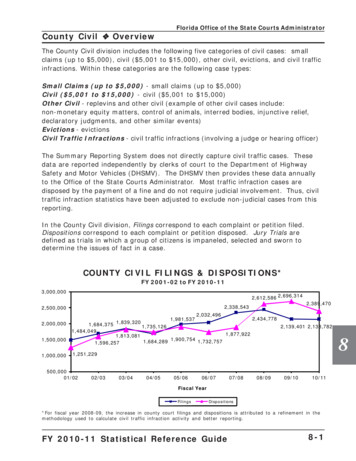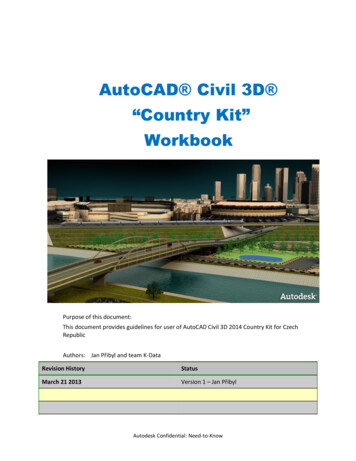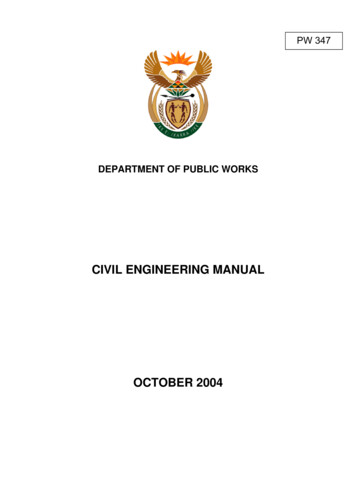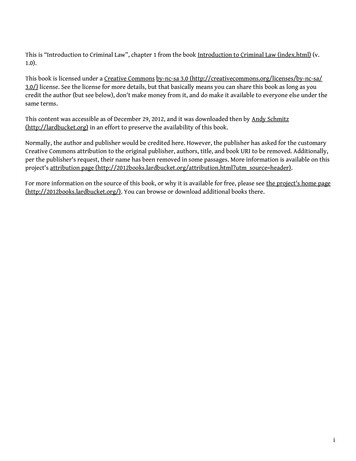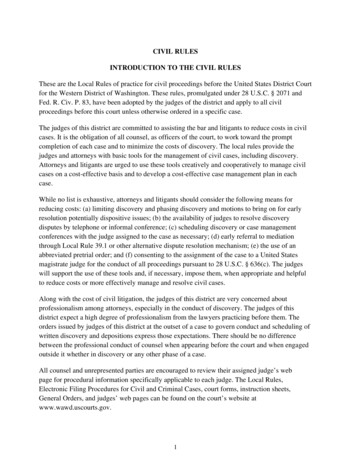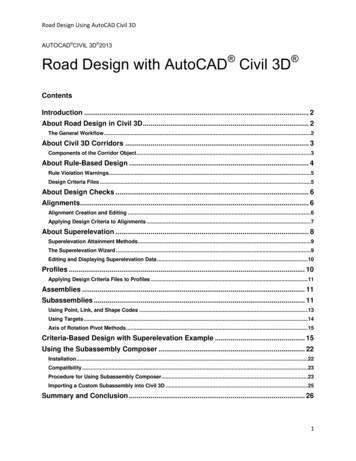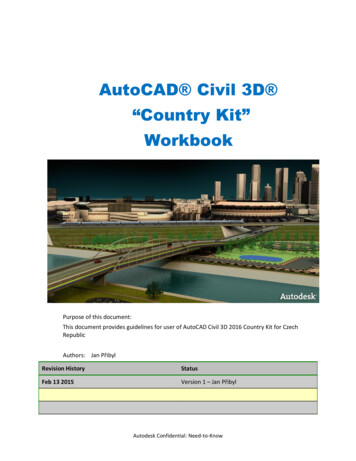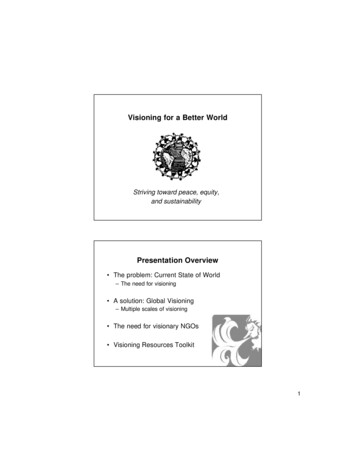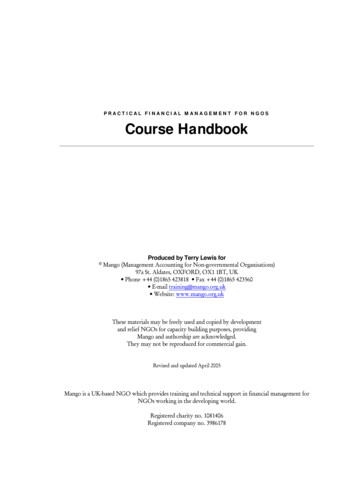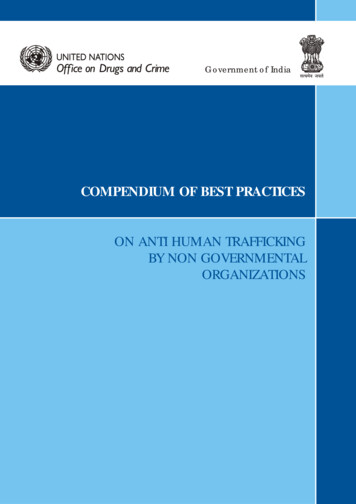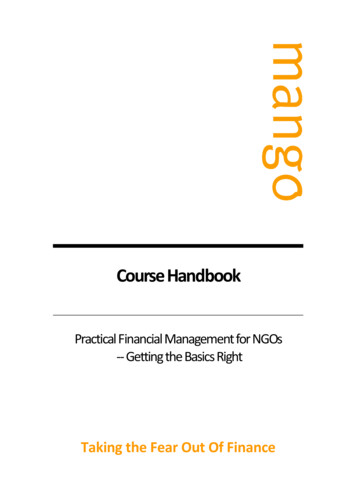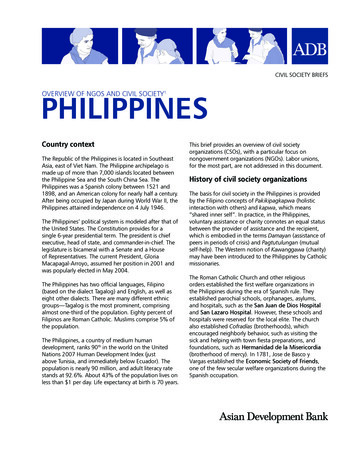
Transcription
civil society briefsoverview of ngos and civil society1PHILIPPINESCountry contextThe Republic of the Philippines is located in SoutheastAsia, east of Viet Nam. The Philippine archipelago ismade up of more than 7,000 islands located betweenthe Philippine Sea and the South China Sea. ThePhilippines was a Spanish colony between 1521 and1898, and an American colony for nearly half a century.After being occupied by Japan during World War II, thePhilippines attained independence on 4 July 1946.The Philippines’ political system is modeled after that ofthe United States. The Constitution provides for asingle 6-year presidential term. The president is chiefexecutive, head of state, and commander-in-chief. Thelegislature is bicameral with a Senate and a Houseof Representatives. The current President, GloriaMacapagal-Arroyo, assumed her position in 2001 andwas popularly elected in May 2004.The Philippines has two official languages, Filipino(based on the dialect Tagalog) and English, as well aseight other dialects. There are many different ethnicgroups—Tagalog is the most prominent, comprisingalmost one-third of the population. Eighty percent ofFilipinos are Roman Catholic. Muslims comprise 5% ofthe population.The Philippines, a country of medium humandevelopment, ranks 90th in the world on the UnitedNations 2007 Human Development Index (justabove Tunisia, and immediately below Ecuador). Thepopulation is nearly 90 million, and adult literacy ratestands at 92.6%. About 43% of the population lives onless than 1 per day. Life expectancy at birth is 70 years.This brief provides an overview of civil societyorganizations (CSOs), with a particular focus onnongovernment organizations (NGOs). Labor unions,for the most part, are not addressed in this document.History of civil society organizationsThe basis for civil society in the Philippines is providedby the Filipino concepts of Pakikipagkapwa (holisticinteraction with others) and kapwa, which means“shared inner self”. In practice, in the Philippines,voluntary assistance or charity connotes an equal statusbetween the provider of assistance and the recipient,which is embodied in the terms Damayan (assistance ofpeers in periods of crisis) and Pagtutulungan (mutualself-help). The Western notion of Kawanggawa (charity)may have been introduced to the Philippines by Catholicmissionaries.The Roman Catholic Church and other religiousorders established the first welfare organizations inthe Philippines during the era of Spanish rule. Theyestablished parochial schools, orphanages, asylums,and hospitals, such as the San Juan de Dios Hospitaland San Lazaro Hospital. However, these schools andhospitals were reserved for the local elite. The churchalso established Cofradías (brotherhoods), whichencouraged neighborly behavior, such as visiting thesick and helping with town fiesta preparations, andfoundations, such as Hermanidad de la Misericordia(brotherhood of mercy). In 1781, Jose de Basco yVargas established the Economic Society of Friends,one of the few secular welfare organizations during theSpanish occupation.
During the late 19th century, several cofradías wereestablished to resist Spanish rule. Some organizations,such as the Cofradia de San Jose, were peasant groupsestablished to fight for Filipino independence. ThePropaganda Movement, led by the native intelligentsia,sought reforms and equal rights for Filipinos. Themovement used Masonic lodges to spread propagandaideals and education in collective action. By contrast,Katipunan was a secular, anti-religious group thatadvocated independence through popular revolution.Katipunan later inspired student activist groups during the1960s and 1970s. All of these were termed asociacionesilicitas (illegal associations) by the colonial government.The Philippine revolutionary army defeated the Spanishin June 1898. Several months later, Spain ceded thePhilippines to the Americans in the Treaty of Paris,placing the country under colonial rule once again.The American colonial government delineatedthe boundaries between state provision of publicgoods, religious philanthropy, and private nonprofitorganizations. The Government was generally supportiveof civil society. For example, the Philippine corporationlaw of 1906 explicitly recognized NGOs, and theGovernment subsidized their operation. AmericanNGOs, such as the American Red Cross and the AntiTuberculosis Society set up branches in the new colony.The American Methodist and Protestant churches andthe Church of England established schools and hospitals,such as Saint Luke’s Hospital and Mary JohnstonHospital. Domestic organizations, such as Asociacionde Damas Filipinas (organization of Filipino women)and the Catholic Women’s Federation also providedwelfare services. In 1917, the Associated Charities ofManila was established to channel public fund-raising tocharitable institutions and hospitals in the city.With the support of the Government, hundreds offarmer credit cooperatives were born in the 1920s and1930s, soon claiming more than 100,000 farmers asmembers. At the same time, dissatisfaction amongpeasants about rural life fueled growth in membershipof the communist movement’s labor federation, theCongress of Labor Organizations (CLO).The communist movement stimulated a counterreactionfrom the Government, religious organizations, andnon-communist NGOs. The Catholic Church expandedits social agenda to direct engagement with workersand peasants, while the Jesuits established three anticommunist organizations, the Institute of Social Order(1947), the Federation of Free Workers (FFW), and theFederation of Free Farmers (FFF). Protestant and othernon-Catholic churches expanded their services into ruraldevelopment, cooperatives, and credit unions, as well asagricultural teaching. In 1952, Dean Conrado Benitez of the University of the Philippines founded the PhilippineRural Reconstruction Movement (PRRM), which claimshave pioneered an era of rural development and localdemocracy in the country.Ferdinand Marcos, who became President in 1965,envisioned a “new society” in which there was littlespace for civil society and no tolerance for advocacyNGOs. His administration became increasingly associatedwith the suppression of civil, human, and political rights.As a result, such organizations either fled undergroundby joining the armed struggle of the NationalDemocratic Front or sought shelter from Marcos’security forces by affiliating with a university or religiousinstitution, such as the Catholic Church’s NationalSecretariat for Social Action (NASSA), the Share andCare Apostolate for Poor Settlers, the Association ofMajor Religious Superior of the Philippines, etc. Otheranti-Marcos organizations operated under innocuousnames, such as the Agency for Community EducationServices and the Organization for Training. The activismof these and other CSOs eventually contributed to theoverthrow of the Marcos regime in the “people power”revolution of 1986, which marked the beginning of aresurgence in civil society.During the dictatorship, many NGOs had built up strongrelationships with poor communities. This was one ofthe reasons why post-Marcos governments partneredwith NGOs in service delivery and public policy.Several pieces of society legislation favorable to civilsociety’s development were passed, including the localgovernment code, the Urban Development and HousingAct, and the Women in Development and NationBuilding Act. Government line agencies opened NGOliaison offices, and NGOs were permitted to negotiatedirectly with bilateral funding institutions for financing.Many in the Philippine development community beganto welcome NGO management of overseas developmentassistance, seeing NGOs as useful channels for funnelingsupport to needy communities.The number of NGOs mushroomed during theadministration of President Corazon Aquino. In additionto those with noble pursuits and good intentions wereNGOs of dubious integrity and engaging in questionablepractices. Some of these were established by politicians,businesspersons, and bureaucrats to advance personal,rather than public, welfare. In response, 10 of the largestNGO networks formed the Caucus of DevelopmentNGO Networks (CODE-NGO) in 1991 to promoteprofessionalism, expand reach, and increase theeffectiveness of NGOs.
Civil society under recent administrationsPresident Fidel Ramos, who served from 1992 to1998, sought the cooperation of civil society, e.g.,by promoting their involvement in multi-stakeholdermechanisms to promote peace in Mindanao.He also advanced the Social Reform Agenda toengage organized poor groups into national policydevelopment. During the Ramos administration, NGOsstimulated vibrant public discourse and helped toredefine the content of politics. Topics that once wouldhave been deemed inappropriate for legislation, suchas violence against women and the rights of indigenouspeople, became common subjects of debate andsuccessful parliamentary legislation. Civil society alsobecame progressively institutionalized and professional.College graduates began to see a career in the nonprofitsector as a viable option.1Many NGO leaders had campaigned for Joseph Estrada,Ramos’ successor, and some were repaid with cabinetappointments. However, civil society quickly becamedisenchanted with Estrada over myriad issues—foreigninvestment regulations, charter change, cronyism, ineptgovernance, poor economic performance, corruption,and limitations on press freedom. More generally,NGOs claimed the Estrada administration did not fulfillits stated agenda to help those in poverty. They wereunsatisfied with the National Anti-Poverty Commission’sreport on the 100 poorest families in every provinceand city, and annoyed by Estrada’s limited attentionto NGO–peoples’ organization (PO)–Governmentpartnerships.Gloria Macapagal-Arroyo came to power in 2001with strong support from civil society. AlthoughNGO–Government relations soured somewhat after shewas accused of fraud in her victory of the PresidentialElection held in May 2004, her administration hasgenerally continued to support the freedom of NGOs.The country’s Medium-Term Philippine DevelopmentPlan, 2004–2010, includes NGO participation as onestrategy for implementing government programs.However, the President’s declaration of state ofemergency in February 2006 raised concerns of a threatto civil liberties. These concerns have been reinforcedby hundreds of extrajudicial killings of militant activists,community workers, and persons associated with leftleaning organizations and party-list groups over thelast 6 years. The United Nations Special Rapporteuron Extrajudicial Killings determined that the military isimplicated directly or indirectly in a significant numberof deaths, a conclusion also drawn by an independentcommission headed by a former Supreme Court Justice.President Macapagal-Arroyo has condemned the killingsand has called for legislation to address them.Organization of Philippine civilsociety today2The civil society sector has made great strides over the last2 decades. NGOs and other civil groups have increasedtheir effectiveness through networking and coalitionbuilding, campaigning for policy reform, adoptinggood practice standards, and advancing “sustainabledevelopment” as a uniting vision for all organizations.The two most important civil society categories in thecountry are NGOs and peoples’ organizations (POs)—the Filipino equivalent of what in other countries arecommonly called community-based organizations.POs are generally composed of disadvantaged individualsand work to advance their members’ material or socialwell-being. POs are grassroots organizations, and theirmembers typically work on a voluntary basis.3 NGOsare intermediaries between the State and POs. Theyadvocate and work for disadvantaged individuals, whoare not necessarily their members. Many NGOs workto strengthen POs by providing financing, establishinglinkages, and undertaking advocacy. In addition toengaging volunteers, NGOs employ staff members.There are several characteristics of Filipino civil societythat are unique. Firstly, political activism takes on alarger role for Filipino organizations than elsewhere.Indeed, NGOs and POs played major roles in achievingFilipino independence from the Spanish and theAmericans, and in toppling the Marcos regime.Secondly, welfare activities emanating from thenongovernment sector are clearly distinguished fromreligious or state-initiated welfare activities. Whereasthe Spanish Catholic Church once dominated charitableand philanthropic activities, Filipino civil society has hada strong secular foundation since the American colonialadministration.Finally, NGOs in the Philippines have benefited fromgovernment administrations that, since the mid-1980s,have been generally supportive of civil society. Thishas resulted in one of the most well-developed andinstitutionalized civil society sectors in the developingworld. The conducive environment for NGO activityis reflected by the headquarters or secretariats forseveral regional and international civil society networks,including the Asia Pacific Alliance for ReproductiveHealth, Clean Air Initiative for Asian Cities, South EastAsian Committee for Advocacy, and the SoutheastAsia Coalition to Stop the Use of Child Soldiers.As noted in a study prepared by the Synergos Institute,Philippine NGOs have successfully advocated for a greaterrole in the delivery of social services, stressing their strong
relationships in local, poor communities—a commitmentthat grew out of working with poor communities underthe Marcos dictatorship. The impacts of developmentNGOs in community development and communityeconomic development have demonstrated the capacityof these NGOs to be flexible, adaptable, and capableof innovative approaches to development challenges.Further, NGOs have typically incurred lower costs underless bureaucratic project implementation measures thanthe Government.4Estimates of the number of civil society groups in thePhilippines range up to 500,000,5 although only afraction of this figure are registered as nonstock,nongovernment institutions (NGOs, POs). Thenumber of “development-oriented” NGOs is put atsomewhere between 3,000 and 5,000.6 In any case,there is consensus that the civil society sector is largeand vibrant by developing country standards, eventhough most of the large number of organizations aresmall, struggle financially, and have weak capacity.Legislative framework for NGO activitiesThree articles of the 1987 Constitution institutionalizethe role of NGOs and POs in Philippine development: Constitution Article II, Section 23: “The state shallencourage non-governmental, community-based, orsectoral organizations that promote the welfare ofthe nation.” Constitution Article XIII, Section 15: “The state shallrespect the role of independent people’s organizationsto enable the people to pursue and protect, within thedemocratic framework, their legitimate and collectiveinterests and aspirations through peaceful andlawful means.” Constitution Article XIII, Section 16: “The right ofthe people and their organizations to effective andreasonable participation at all levels of social, politicaland economic decision-making shall not be abridged.The state shall, by law, facilitate the establishment ofadequate consultation mechanisms.”The Local Governance Code (LGC) of 1991 furthers theConstitution’s aims by establishing a role for “peoplepower” at the local level. The LGC establishes A process of accreditation of NGOs and POs at thelocal level A local governance infrastructure composed of fivespecial bodies, one of which (the local developmentcouncil) must be formed at the village level A stipulation that at least one quarter of the localdevelopment council’s membership must come fromcivil society or the private sector. The civil societyrepresentatives must come from locally-accreditedorganizations The right of the people to amend, revoke, and enactordinances through referendaProvisions for the establishment of other localcommittees, such as cooperativesThe LGC is a formalization of the barangay (village) systemof local governance, which existed in the Philippinesbefore the arrival of the Spaniards. It mandates thetransfer of power, resources (40% of internal revenue tolocal bodies), and responsibilities from national to localgovernments through a process of devolution.NGO registration7Registration is not mandatory for CSOs in the Philippines,but only registered organizations benefit from a legalidentity that permits them to open a bank account, sueand be sued, etc. Further, registration is officially requiredto accept donations or to participate in governmentprojects.CSOs that choose to register usually do so with theSecurities and Exchange Commission (SEC), CooperativeDevelopment Authority (CDA), or Department of Laborand Employment (DOLE). The SEC registers nonstock,nonprofit corporations pursuant to the CorporationCode of the Philippines. Eligible organizations includethose that are established for religious, charitable,scientific, athletic, cultural, rehabilitation of veterans,and social welfare purposes.The CDA registers cooperatives as provided for in theCooperative Law of the Philippines and the CooperativeDevelopment Authority Act. DOLE registers labor unions,labor federations, and rural workers’ associations inaccordance with the Labor Code of the Philippines.Additionally, nonprofit corporations and associationsintending to perform social work and to function asmutual benefit associations and trusts for charitablepurposes obtain licenses from the Department ofSocial Welfare and Development, and the InsuranceCommission, respectively. Nonprofit educationalinstitutions and health organizations obtain permitsto operate from the Department of Education and theDepartment of Health, respectively.Philippine NGOs have been at the cutting edge ofNGO self-regulation. CODE-NGO, the largest coalitionof NGOs in the country, established the “Code ofConduct for Development NGOs” in 1991. It was thefirst Asian NGO coalition to adopt a code of conduct inAsia, and probably one of the first in the global NGOcommunity. CODE-NGO’s Code of Conduct has sincebeen signed by more than a thousand NGOs and wasrecently updated to provide for clearer enforcement
mechanisms. In 1998, the Philippine Council for NGOCertification (PCNC) was established by six of thelargest NGO coalitions. It represents one of the veryfew government-recognized NGO certification systemsin the world and has been the subject of discussionand possible replication by NGOs in different countries.Both initiatives are repeatedly cited as models of goodpractice and analyzed extensively.8Tax treatment of NGOs9Exemption from income tax is extended to a broadrange of organizational forms, including Nonstock corporations organized exclusively forreligious, charitable, scientific, athletic or culturalpurposes, or for the rehabilitation of veterans; Civic leagues or organizations operated exclusivelyfor the promotion of social welfare; and Nonstock, nonprofit educational institutions.Each of these entities is exempt from income taxon donations, grants, and gifts, provided that theorganization’s net income does not inure to the benefitof any private shareholder or individual. Profits generatedfrom business activities are taxed, regardless of thedisposition of the income.A nonprofit organization may seek additional taxbenefits by becoming an accredited nonstock, nonprofitcorporation or an “accredited NGO.” This certificationvests the organization with donee institution status,which entitles it to receive tax-deductible donations.In the case of an accredited nonstock, nonprofitcorporation, donations are deductible up to 5% oftaxable income for corporate donors and 10% forindividual donors.For this purpose, “income” refers to the donor’s incomederived from trade, business, or profession as computedwithout the benefit of this deduction. In the case of anaccredited NGO, donations are deductible in full. Anaccredited NGO is also subject to additional restrictions,including a requirement that it devote no more than30% of its total expenses for the taxable year toadministrative expenses.For the past several years, the PCNC has beenresponsible for certifying NGOs applying for “doneeinstitution” status. The status serves as a basis for theBureau of Internal Revenue to award this status, therebyallowing donations to be deducted from a donor’staxable income and exempted from donor’s tax. Itwas envisioned that the certification process wouldencourage local donations to NGOs, while at the sametime making the nonprofit sector more professional andtransparent. The PCNC was delegated the powers ofcertification through a Memorandum of Understandingwith the Department of Finance.Although the PCNC has been recognized for doinggood work, it has not been relevant for all CSOs.For example, NGOs, which do not raise funds fromdomestic corporations, are unable to take advantageof “donor institution status” and, consequently, opt toavoid the accreditation process and the accompanyingrequirements and fees (10,000–20,000 pesos,depending on an NGO’s assets).As of 22 October 2007, the PCNC had certified fewerthan 500 of the approximately 6,000 eligible NGOsoperating at the time of its launch. On that date, anExecutive Order was issued by the Office of the Presidentdivesting the PCNC of its certification function on thebasis that the regulatory functions of governmentagencies needed to be strengthened over nonstock,nonprofit corporations. The PCNC appealed for a repealof the Executive Order, leading to a decision by PresidentMacapagal-Arroyo to order a review of the directive.NGO capacityThe Philippine NGO sector features a wealth ofexperience and expertise. Many capable staff of suchorganizations become trainers and mentors for otherswithin the country and internationally. Foreign NGOsand governments often send staff to the Philippines tolearn about civil society and cooperation between theGovernment and NGOs. The ability of the country’sCSOs to promote social accountability has become oneof their defining features.A survey of capacity-building priorities for PhilippineNGOs highlighted planning and strategic management,program design and implementation, staffdevelopment, fund-raising, and financial management.10A number of organizations provide training for NGOsprofessionals. Both the Asian Institute of Managementand the International Institute of Rural Reconstructionoffer graduate programs in development managementfor mid-level, nonprofit managers. The Center forLeadership, Citizenship and Democracy also featurecivil society and NGO management in some of itstraining and consultancy programs. Venture for FundRaising trains nonprofit organizations in the Philippines(and in other countries) on how to mobilize resourcesfor their activities. Networks of private foundations,such as the Association of Foundations and PhilippineBusiness for Social Progress (PBSP), providecapacity-building workshops in areas, such as boarddevelopment, resource mobilization, and volunteermanagement.
Many Philippine NGOs are highly dependent onvisionary founders or dynamic leaders and, therefore,put themselves at risk when such key figures moveon, e.g., to accept appointments in the governmentadministrations. Their departure can lead to majorinternal organizational challenges, as well as to a declinein public support.Other common phenomena on the Philippine NGOscene include targeting of the same population byseveral organizations, and the existence of coalitionsand networks that boast significantly overlappingmembership (this is particularly true in the case offoundations). These practices lead to competition forfunding and duplication of efforts.Associations of NGOs and foundationsAsian NGO Coalition for Agrarian Reform andRural DevelopmentANGOC is a regional NGO association of 21 nationaland regional NGO networks from 11 Asian countriesactively engaged in food security, agrarian reform,sustainable agriculture, and rural development activities.Its member-networks have an effective reach of 3,000NGOs throughout Asia.ANGOC6-A Malumanay StreetUP Village, DilimanQuezon City 1103PhilippinesTel 63 2 433 7653/433 7654Fax 63 2 921 7498angoc@angoc.ngo.phwww.angoc.ngo.phAssociation of FoundationsFounded in 1972, the Association of Foundations is anational network of 134 NGOs and foundations thatcarry out programs in education, art and culture, scienceand technology, governance, social development,microfinance, and environment. It serves as a capacitybuilder, data bank, consultant, and advocate of keyissues, and as a bridge to grant opportunities.Association of FoundationsRm. 1102, 11th Floor, Aurora TowerAurora Boulevard, CubaoQuezon City 1109, PhilippinesFax 63 2 911 9792/913 7231afonline@info.com.phwww.afonline.org Caucus of Development NGO Networks (CODE-NGO)CODE-NGO was organized in 1991 by 10 of the largestnetworks in the country. Today, CODE-NGO counts, asits members, seven national networks and four regionalnetworks representing more than 2,500 NGOs, POs, andcooperatives all over the country. As an organization ofscale, CODE-NGO has the broadest purview of NGO/POissues and concerns. It has been an effective forum fordiscussion and consensus building of issues among itsmembers. It represents its members with governmentand donor agencies to advocate for the concerns ofNGOs, POs, and the sectors and communities they assist.Member networks of CODE-NGO include theAssociation of Foundations, Coalition of BicolDevelopment NGOs, Cordillera Network of NGOs andPOs, CODE-NGO National Capital Region Formation,Mindanao Coalition of Development NGOs, NationalConfederation of Cooperatives, National Council forSocial Development, National Secretariat for SocialAction – Justice and Peace, Partnership of PhilippinesSupport Service Agencies, PBSP, Philippine Partnershipfor the Development of Human Resources in RuralAreas, and the Visayas Network of Development NGOs.CODE-NGO National Secretariat2F Center for Community Services BuildingSocial Development ComplexAteneo De Manila University, Katipunan Avenue1108 Quezon City, Metro Manila, PhilippinesTel 63 2 426 6001Fax 63 2 426 5938caucus@codengo.orgwww.codengo.orgNGO Forum on ADBNGO Forum on ADB is global network of nongovernmentand community-based organizations that monitor andcritique Asian Development Bank (ADB)-financed projectsand programs, raising issues of concern primarily related tothe environmental and social impacts of ADB operations.The network was formed as the NGO Working Groupon ADB in 1992, but later adopted its current name andbecame legally incorporated in the Philippines in 2001.NGO Forum on ADB has 85 partner organizations andmaintains an e-group with 223 members.NGO Forum on ADB85-A Masikap ExtensionCentral District, DilimanQuezon City, PhilippinesTel 63 2 921 4412Fax 63 2 index.htm
Pambansang Lakas ng Kilusang Mamamalakaya ngPilipinas (Pamalakaya)Founded in 1987, Pamalakaya is a nationwide federationof fisherfolk organizations with total individualmembership of 80,000. It is composed of fishermenand women in coastal and inland waters and workersin commercial fishing and aquaculture. The federationhelps members to build local organization to undertakecooperative endeavors; educates on issues and concernsaffecting fisherfolks; spearheads campaigns to advancethe socioeconomic and political aspirations of fisherfolk;conducts research; and organizes symposia, fora, aka.htmPeasant Movement of the Philippines –Kilusang Magbubukid ng Pilipinas (KMP)KMP is a nationwide federation of Philippineorganizations of landless peasants, small farmers, farmworkers, subsistence fisherfolk, peasant women, andrural youth. Its organizations claim a total membership800,000 rural people. It is the nation’s largest farmers’organization and embraces its militant reputation. KMPhas 55 provincial and six regional chapters nationwide.KMP organizes farmers, files court cases, carries out lobbywork, and conducts strikes and protest actions. It callsfor land reform while opposing foreign investment in theagrarian sector, charter change, free trade in agriculturalproducts, and higher commodity prices for farmers.Kilusang Magbubukid ng Pilipinaskmp@tri-isys.comwww.geocities.com/kmp ph/strug/index.htmlPhilippine Business for Social Progress (PBSP)PBSP is a private and nonprofit foundation dedicatedto promoting business sector commitment to socialdevelopment. Organized in 1970 by 50 of the country’sprominent business leaders, it has since grown tobecome the nation’s largest business-led socialdevelopment foundation. Since its establishment, PBSPhas grown to about 217 members, worked with some3,000 partner organizations, and provided more than4.8 billion pesos in financial assistance, which hassupported more than 4,900 projects that benefited closeto 2.8 million poor households. PBSP is Southeast Asia’sfirst nonprofit consortium of companies advocating forcorporate social responsibility.Philippine Business for Social ProgressPSDC Building, Magallanes corner Real Streets1002 Intramuros, Manila, PhilippinesTel 63 2 527 7741 to 7751Fax 63 2 527 3743pbsp@pbsp.org.phwww.pbsp.org.phPhilippine Rural Reconstruction Movement (PRRM)PRRM’s mission is to enhance the capacity ofrural communities in the planning, advocacy, andimplementation of sustainable development throughan integrated program of education, livelihood, health,habitat, environment, and self-governance. PRRM has17 accredited chapters in 14 provinces and three citiesof Metro Manila.Philippine Rural Reconstruction Movement56 Mother Ignacia Avenue corner Dr. Lazcano StreetQuezon City 1103, PhilippinesTel 63 2 372 4991Fax 63 2 372 4995info@prrm.org
after being occupied by Japan during world war ii, the Philippines attained independence on 4 July 1946. the Philippines' political system is modeled after that of the United states. the constitution provides for a single 6-year presidential term. the president is chief executive, head of state, and commander-in-chief. the
